- Joined
- Oct 9, 2007
- Messages
- 47,300 (7.53/day)
- Location
- Hyderabad, India
| System Name | RBMK-1000 |
|---|---|
| Processor | AMD Ryzen 7 5700G |
| Motherboard | ASUS ROG Strix B450-E Gaming |
| Cooling | DeepCool Gammax L240 V2 |
| Memory | 2x 8GB G.Skill Sniper X |
| Video Card(s) | Palit GeForce RTX 2080 SUPER GameRock |
| Storage | Western Digital Black NVMe 512GB |
| Display(s) | BenQ 1440p 60 Hz 27-inch |
| Case | Corsair Carbide 100R |
| Audio Device(s) | ASUS SupremeFX S1220A |
| Power Supply | Cooler Master MWE Gold 650W |
| Mouse | ASUS ROG Strix Impact |
| Keyboard | Gamdias Hermes E2 |
| Software | Windows 11 Pro |
Huawei is planning a response to a recent administrative move by the U.S. Department of Commerce that makes it impossible for foreign companies such as Taiwan's TSMC to serve it. Huawei's mobile SoC design house subsidiary, HiSilicon, is highly dependant on TSMC to contract manufacture its SoCs on the company's 7 nm (N7), and various 10 nm-class FinFET nodes. Huawei is preparing to port some of its SoC designs to a 14 nm node of China's state-owned Semiconductor Manufacturing International Corp (SMIC) as contingency. Without access to 7 nm, Huawei's plans to lead the global 5G infrastructure market would hit severe roadblocks. The U.S. move has triggered a heated (and somewhat loaded) reprisal from Global Times, a newspaper that's regarded in diplomatic circles as a platform for hawkish unofficial messaging by the Chinese government.
China could blackmail the U.S. into lifting its trade ban and a more recent supplier-access denial to Huawei, with potential shortages of essential medical supplies, particularly face masks. An eminent Chinese industrial analyst, Ma Jihua, told Chinese newspaper Global Times: "The Huawei problem has been elevated to one of national interests and Chinese firms may stop supplying much-needed face masks if the U.S. provokes [a fight with Huawei]." In addition to Chinese suppliers, American firms such as 3M manufacture face masks in China, besides several other consumables needed to fight epidemics, such as gloves, hazmat suits, goggles, etc.

Over 1,700 people in the U.S. tested positive for an NCoV infection, and have been quarantined. Maintaining these quarantines, along with the arduous task of decontaminating large populated areas, requires a steady supply of consumables for healthcare and sanitation workers. The United States government in May 2019 imposed a trade ban on Huawei, forcing much of the western tech industry to boycott the Chinese company in compliance with the ban.
The U.S. government has, however, given Huawei some breathing room with an administrative ordinance that allows U.S. companies to do business with Huawei until May 15, 2020, extending from a previous deadline of April 1. The administration also cleared the decks for easy import of medical equipment and supplies from China, something the Global Times report interprets as a tacit admission by the U.S. that it needs China to fight COVID-19. "The US recently granted exclusions for medical products from China, giving a tacit sign of its reliance on Chinese supplies just like US rural areas depend on Huawei telecom equipment," reads the report.
View at TechPowerUp Main Site
China could blackmail the U.S. into lifting its trade ban and a more recent supplier-access denial to Huawei, with potential shortages of essential medical supplies, particularly face masks. An eminent Chinese industrial analyst, Ma Jihua, told Chinese newspaper Global Times: "The Huawei problem has been elevated to one of national interests and Chinese firms may stop supplying much-needed face masks if the U.S. provokes [a fight with Huawei]." In addition to Chinese suppliers, American firms such as 3M manufacture face masks in China, besides several other consumables needed to fight epidemics, such as gloves, hazmat suits, goggles, etc.

Over 1,700 people in the U.S. tested positive for an NCoV infection, and have been quarantined. Maintaining these quarantines, along with the arduous task of decontaminating large populated areas, requires a steady supply of consumables for healthcare and sanitation workers. The United States government in May 2019 imposed a trade ban on Huawei, forcing much of the western tech industry to boycott the Chinese company in compliance with the ban.
The U.S. government has, however, given Huawei some breathing room with an administrative ordinance that allows U.S. companies to do business with Huawei until May 15, 2020, extending from a previous deadline of April 1. The administration also cleared the decks for easy import of medical equipment and supplies from China, something the Global Times report interprets as a tacit admission by the U.S. that it needs China to fight COVID-19. "The US recently granted exclusions for medical products from China, giving a tacit sign of its reliance on Chinese supplies just like US rural areas depend on Huawei telecom equipment," reads the report.
View at TechPowerUp Main Site



